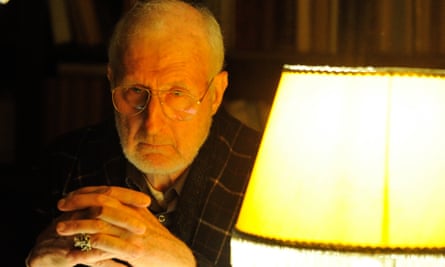Like Don Draper or Tony Soprano, the hero of Paolo Sorrentino’s new Sky TV series is a man who finds himself promoted within a prestigious organisation. He is beset by personal doubts and distracted and seduced by vulgar office politics. The opening episodes of The Young Pope premiered here at Venice: it’s all very strange, anxious, whimsical and surreal; Jude Law is on top form as the cunning, troubled young Pontiff. Actually, this might yet turn out to be Sorrentino’s Twin Peaks.
Law plays Lenny Belardo, a conservative American cardinal who becomes the first American Pope in history, and styles himself Pius XIII, an unlucky handle which some associate with Papal support for Mussolini.
Lenny’s victory was the result of botched Machiavellian intrigue from his mentor, Cardinal Michael Spencer (James Cromwell) - a character perhaps inspired by the formidable Vatican bank president Archbishop Paul Marcinkus - who had himself wanted to become Pope. On gaining office, the impassively and handsomely smiling young Pope reverses a Vatican smoking ban introduced by his predecessor John Paul II – but only for himself.

He demands Cherry Coke Zero at breakfast, angrily reproves an ageing nun for presuming to kiss his forehead and starts a coolly cerebral duel with the worldly and ambiguous time-server Cardinal Voiello (Silvio Orlando) who had hoped to manipulate the young American and become the power behind the throne – and to this end Voiello instructs his subordinates to investigate the young Pope’s orphaned youth with a view to subtle blackmail.
For his part, the Pope orders Voiello’s priest-confessor to break the secrecy rule and reveal the Cardinal’s sins – which turn out to be lustful thoughts for an ancient statue: the Venus of Willendorf, which Paolo Sorrentino imagines to have been transported from Austria to the Vatican.
Most importantly of all, the young Pope gives an intimate secretarial post to the ageing nun who took him in and looked after him when he was a fatherless, motherless kid: this is Sister Mary – and seeing Diane Keaton in a nun’s habit is one of the show’s real highlights.

What we saw at Venice was the first two episodes of a TV show and so it needs time to grow. The emphasis isn’t on needing to know what happens next. Yet perhaps that’s partly because knowing what has just happened is difficult enough.
Sorrentino may well have been influenced by Nanni Moretti’s We Have A Pope (2011), about the troubled papacy of John Paul I, with its comic scenes of all the Cardinals together in their little cell-like bedrooms and the new Pontiff’s calamitous failure to give a stirring address to the faithful in St Peter’s.
But everything has the Sorrentino signature: superbly composed, stylised silent group scenes and tableaux, dreamy ambient electronic music, a woozy state of weightlessness, a mood somewhere between wonder and anxiety. As in The Great Beauty, there is a great reverence for Rome and the papal mysteries of Romanità. As in his previous movie, Youth – on which this is a great improvement – there is a dazzling dream sequence involving Venice, a city with painful, personal associations for the young Pope. Sometimes, Sorrentino’s English-language work has looked uncertain, but the concept of an English-speaking Pope to whom Italian Cardinals must speak English gives Sorrentino a link back to his home turf.
The tone is set at the very beginning with a troubling, hallucinatory image of Lenny crawling out from under a pile of sleeping babies. We see him drift through a Papal ante-chamber, as lethal and opaque as a Renaissance court, exchanging cool smiles and nods with scheming Cardinals. But he reserves the biggest cat-that-got-the-cream smile for the camera as the title is flashed up.
It’s really good stuff from Jude Law – perhaps his best and meatiest performance since Dickie Greenleaf in The Talented Mr Ripley (1999). He is sleek, handsome, vain – and Law wears those white robes very well. He has the figure for them, as no older incumbent had.
Silvio Orlando does well as the unreadable courtier Voiello: it’s a rather Andreotti-like role and could possibly have gone to Sorrentino’s great leading man Toni Servillo – though Servillo probably couldn’t work in any other role than lead.
The Young Pope is an amusingly, exhilaratingly mischievous piece of work. There are all the makings of a cult hit. It will be fascinating to see how this director’s style plays out in longform TV.
- The Young Pope will air on Sky Atlantic from 27 October.

Comments (…)
Sign in or create your Guardian account to join the discussion